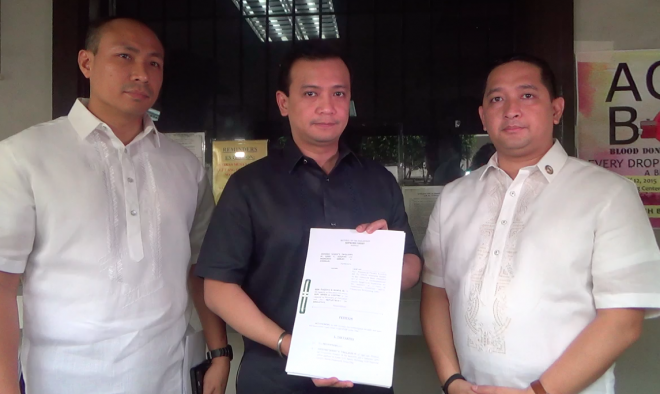De Lima ally says drug lords getting back at senator

Magdalo party list Rep. Gary Alejano (left) poses with Senator Antonio Trillanes IV and fellow Magdalo Rep. Francis Ashley Acedillo (middle and right) in this file photo taken May 6, 2015. NOY MORCOSO / INQUIRER.net
It’s payback time for the drug lords who were hit by the campaign of the past administration to clean up the New Bilibid Prisons (NBP), as they now try to link Senator Leila de Lima to the illicit drug trade in the national penitentiary, an opposition lawmaker said yesterday.
Magdalo partylist Rep. Gary Alejano said that in 2013, the then Aquino administration put together a strategy to address the proliferation of drugs at the NBP.
Now, this strategy is being used against De Lima by the Duterte administration and drug lords like Herbert Colanggo, who was among the convicted drug lords whose business was badly hurt by the previous administration’s antidrug campaign at the NBP, Alejano said.
READ: Cons pin down De Lima | Duterte: De Lima ‘allowed’ illegal drug trade inside Bilibid
At a press conference, Alejano said lawmakers from the 16th Congress, including himself, were briefed on the Aquino administration’s strategy to combat the menace, which profited some P4 billion a month right inside the NBP that time.
Article continues after this advertisementPart of the strategy was to use another convicted drug lord, Jaybee Sebastian, as a government asset.
Article continues after this advertisementSebastian and Colanggo were rivals at the NBP, Alejano said.
Colanggo is among the witnesses presented by Justice Sec. Vitaliano Aguirre II linking De Lima to the drug trade at the congressional hearing on the proliferation of drugs at the NBP.
“It is a reality. It is the truth that the government used Jaybee Sebastian. That is what I know,” Alejano said.
He described the strategy as an inter-agency effort with De Lima, then the Justice Secretary, and then NBP superintendent Franklin Bucayo.
Among the other agencies that were part of the antidrug campaign were the Philippine National Police (PNP) and the Presidential Anti-Organized Crime Commission (PAOCC), Alejano said.
Alejano said De Lima, Bucayo, and other officials from the interagency task force met with him and other lawmakers to explain the strategy before the big NBP raid in December 2014.
Alejano said there were two major groups inside the national penitentiary—the Commando and the Presidio.
Sebastian led the Commando, while Colanggo was head of the Presidio.
“It was discussed how to carry out the raid. We know the contraband. We know the personalities… Jaybee Sebastian was going to be used (as an asset) because if you arrest all of them, no one would give information (to government) anymore,” Alejano said.
But Sebastian was quite a talkative and boastful asset, practically confirming to everyone else at the NBP that he was working for government.
Alejano said that at one point, a grenade was set off in front of Sebastian’s kubol, or a special detention area, allegedly by the drug lord’s rivals.
Sebastian is not among the witnesses of Aguirre in the congressional hearing.
“It is good to listen to the testimonies because all these testifying now are angry at Jaybee Sebastian. They are mad because Jaybee squealed on them,” Alejano said.
At the House investigation, Colanggo, wearing a pristine white short-sleeved barong, claimed that De Lima received millions in kickback in the drug trade, not only in exchange for allowing beer inside the NBP during his concerts, but to fund her senatorial bid as well.
Another witness presented by Aguirre, convicted kidnapper Rodolfo Magleo, claimed that he was an “adviser and confidant” of Sebastian.
Magleo, a former policeman convicted in 2004, said Sebastian’s drug business flourished during De Lima’s term as Justice Secretary.
Magleo said Sebastian told him he became “untouchable” at NBP because he financed De Lima’s senatorial bid, and that he also gave money to Bucayo.
Sebastian also allegedly claimed that he gave De Lima P10 million for his competitors to be transferred to Building 14, on top of the monthly P1 million that he supposedly gave her.
Alejano defended Bucayo from allegations that he also profited from the drug trade at the NBP.
Alejano said Bucayo, in fact, resigned because of the “extreme pressure” on him to eradicate the drug trade, but the reality is it was a difficult campaign because of the so-called “Bilibid culture” where the “symbiotic relationship” between inmates and penitentiary employees was hard to break.
While it was an uphill battle, Alejano expressed belief the drug trade “has been reduced significantly.”
“It has not been eradicated. But the point is, there was a drug trade, which was studied thoroughly, and that began in 2013, that the last administration raided the NBP and that was how the drug trade was exposed,” Alejano said.
Alejano said that it must be “clarified” that the efforts to clean up the national penitentiary of drug syndicates began during the time of then President Benigno Aquino III, and not just when President Duterte assumed office and declared a war on illegal drugs.
“The timelines are very important,” Alejano said. CBB